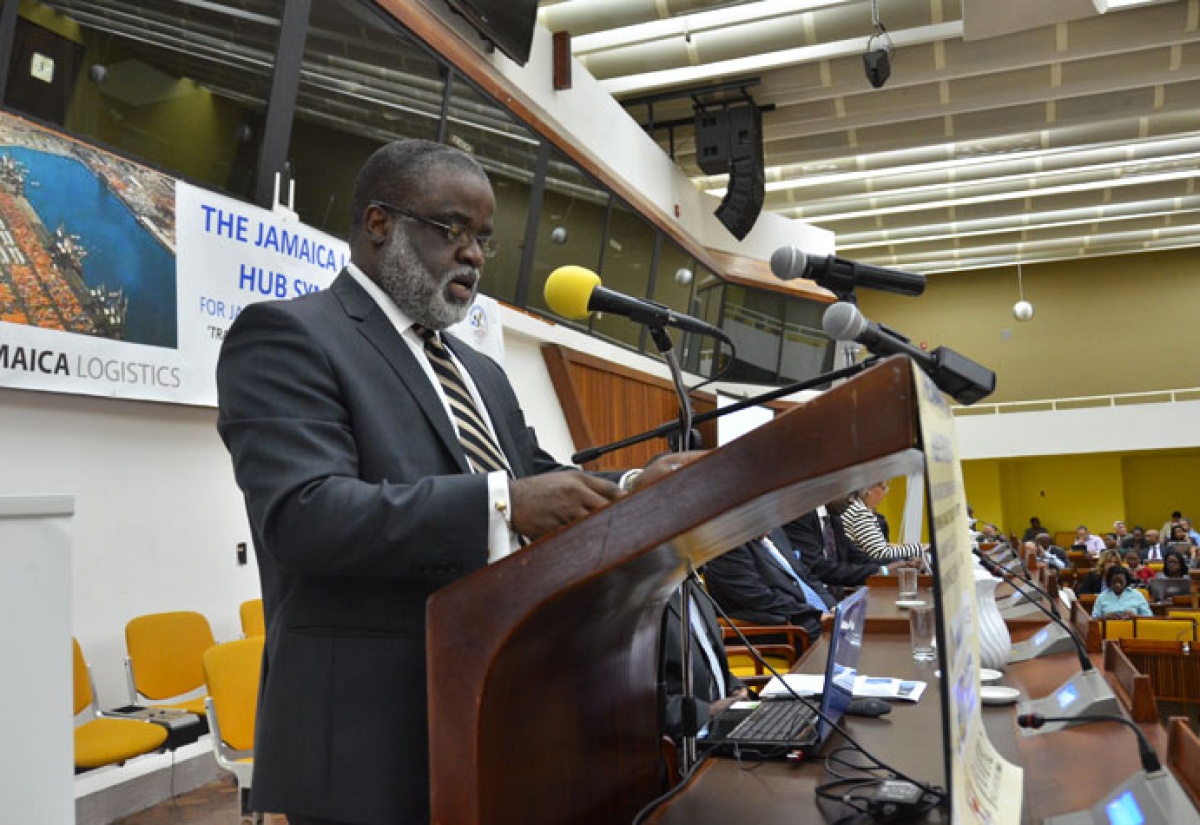Work Progressing on Special Economic Zones
By: , January 22, 2014The Key Point:
The Facts
- The zones represent a significant enhancement to the country’s industrial infrastructure.
- The Government, with support from the World Bank and the Inter-American Development Bank, is making a special effort to assist MSMEs operating in the logistics hub environment.
The Full Story
Work on the planning and implementation of special economic zones, which will form part of the Logistics Hub infrastructure, are advancing, even as the Government continues to engage and energize the business community to capitalize on the opportunities the project presents.
Chairman of the Logistics Task Force, Dr. Eric Deans, updated the local business community on Tuesday, January 21, at the opening session of the two-day Jamaica Chamber of Commerce/JAMPRO Jamaica logistics hub symposium, at the Jamaica Conference Centre, in downtown Kingston.
Already, 16 economic zones close to major air and sea ports have been identified in Kingston, Montego Bay, Old Harbour and Clarendon, among other areas. “These facilities will operate within a legal framework consistent with international best practices, market requirements, and the government’s objectives,” Dr. Deans noted.
He pointed out that the zones represent a significant enhancement to the country’s industrial infrastructure, and as part of the integrated development strategy, areas around the zones will be developed for other uses, such as commercial, residential and recreational.
Meanwhile, the Chairman pointed out that the first of a number of bulk ports, which will be located in the eastern end of the island, will provide storage for crude oil and petroleum products, among other things. This will help in the provision of uninterrupted supplies of these products to the global market.
He noted that container shipping represents 15 per cent of the global trade, with the remaining 85 per cent, in bulk commodities.
Dr. Deans explained that in the short term, the initiative involves enhancement to existing infrastructure, such as the port of Kingston, and the airports. In the medium to long term, he said, new facilities, such as commodity ports, and cargo airports, will be contemplated.
“Tens of thousands of jobs, and Micro, Small and Medium-sized Enterprise (MSME) opportunities are expected to be derived from the logistics hub initiative…the opportunities are vast,” he argued.
He noted that the Government, with support from the World Bank and the Inter-American Development Bank, is making a special effort to assist MSMEs operating in the logistics hub environment.
Dr. Deans said to this end, industry clusters are being designated within the special economic zones. These will enable firms to combine their efforts and resources in collaboration with government, to achieve higher levels of competitiveness.
He emphasised that it is necessary to have a workforce to fill the jobs related to the many economic activities, which the hub will generate, adding that education, training and entrepreneurial skill development, and the enabling legislation, are some of the initial activities the government has undertaken in setting the stage for the establishment of the hub.
The Chairman informed that the HEART Trust/NTA is fine-tuning a proposal for the full roll-out of entrepreneurship training for all its programmes. “This means that all HEART Trust trainee will be exposed to entrepreneurial skills training,” he noted.
Meanwhile, HEART is also seeking to include in the curriculum of all Ministry of Education-run schools, an introductory entrepreneurial course.
The national training agency also plans to offer similar courses to teachers’ colleges and universities, and employees within the public and private sectors.
Dr. Deans’ presentation covered a number of key areas, including: special economic zones; public relations and marketing; investment and public-private partnerships; international trade policy; master planning; and education and training.
The session also featured presentations from Director General of the Jamaica Civil Aviation Authority, Leroy Lindsay, on aviation logistics; Chairman of the Jamaica International Financial Services Authority (JIFSA), Eric Crawford, on Jamaica as a hub for international financial services, and the promotion of Jamaica as a law tax centre for international financial services; and a review of potential directions of the logistics industry up to 2050, by former President of JAMPRO, Patricia Francis.
Attending the symposium are key players in the private sector, experts in logistics, investors, government officials, members of the diplomatic corps, as well as a wide cross-section of other critical stakeholders.
The Jamaica Logistics Hub is central to the government’s economic growth strategy, aimed at driving investment and creating sustainable employment over the long term. Jamaica will seek to capitalize on its prime location for increased maritime and aviation traffic through the region, with the opening of the expanded Panama Canal in 2015.
The hub will allow Jamaica to elevate its position in the global value and supply chains, with facilities that feature state-of-the-art special economic zones, attracting major transnational manufacturing and distribution companies. The hub will also present a myriad of opportunities for the growth of micro, small and medium sized businesses, through linkages that connect them to global markets.


